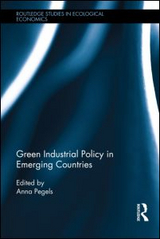External publications

Reforming fossil fuel subsidies in the MENA countries
Vidican, GeorgetaExternal Publications (2014)
in: Anna Pegels (ed.), Green industrial policy in emerging economies, London: Routledge, 148-178
ISBN: 978-0-415-87067-2
Information
Yet the challenges posed in achieving these outcomes are mostly socio-economic and political. In the MENA region, with its neo-patrimonial govern¬ance systems and strong states of a rentier and clientelistic nature, the social contract is deeply rooted in the political apparatus and the alli¬ances between various stakeholders. The social contract pivots on the strategic redistribution of rents. Yet, there is growing evidence to show that fossil fuel subsidies in particular have been disproportionately benefiting middle- and upper-income popula¬tion groups and have also contributed to market distortions to the detriment of renewable energy, energy efficiency and green growth (IMF 2013a).
In line with the theme of this book, this chapter explores ways of managing the process of withdrawing rents from incumbent groups in the process of green transformation, offering a complementary perspective to the other case studies concerned with the process of rent creation and allocation. The MENA region provides a fascinating example of this process, due to the complexity of reform. According to IMF (2013a: 10), the MENA region accounts for 50 per cent of global pre-tax energy subsidies, representing over 8.5 per cent of regional GDP or 22 per cent of total government revenues, with one-half of the subsidies being granted on petroleum products. Following the Arab Spring uprisings, subsidies have been further increased across the region, showing just how deeply entrenched they are in the political systems of the MENA countries.
As a result of these challenges, the track record of fossil-fuel reform has been very poor in the region, only small steps having been taken by such countries as Egypt, Tunisia and Morocco, while countries that undertook more comprehen¬sive reforms, such as Jordan, have shown little ability to sustain reform in the face of economic and political crisis. Hence, assessing how to manage the process of rent withdrawal and what state capabilities are needed to launch and sustain reform is highly pertinent.
This chapter is structured as follows: Section 7.2 discusses the levels of fossil fuel subsidies in the MENA region and highlights existing policies as they affect energy prices in various countries. Section 7.3 takes a more empirical approach to exploring in greater depth the experience of reform in two countries, Egypt and Morocco, by reviewing the motives for reform, the approach taken to man¬aging trade-offs, and the capabilities enlisted in this effort. Section 7.4 compares and contrasts these aspects, while reflecting on the experience of other countries in the region that have engaged in the reform process more vigorously.
Contact
Cornelia Hornschild
Publication Coordinator
E-mail Cornelia.Hornschild@idos-research.de
Phone +49 (0)228 94927-135
Fax +49 (0)228 94927-130
Alexandra Fante
Librarian/ Open Access Coordinator
E-Mail Alexandra.Fante@idos-research.de
Telefon +49 (0)228 94927-321
Fax +49 (0)228 94927-130



![[Translate to English:] Photo: Alexandra Fante, Bibliothekarin/Open Access-Koordinatorin](/fileadmin/_processed_/f/0/csm__c_Deutsches-Institut-fuer-Entwicklungspolitik_Fante_94ce4fa1ba.jpg)